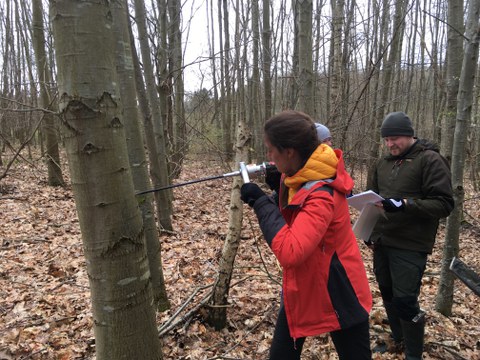Research projects
Ongoing projects:
µDYNAST: Spread and microbial colonization of black cherry
Subproject 1: Spread, growth and effects on vegetation
Black cherry, native to North America, was introduced to Europe in the 17th century and has been used in forestry since the 19th century. Today, it is considered an invasive neophyte due to its high spread potential. Particularly in open forest stands, it displaces native species and inhibits the regeneration of other tree species. Observations from the Müritz National Park indicate that older black cherries lose vitality, potentially influenced by site conditions and phytopathogens. The µDYNAST project investigates the species’ spread dynamics and microbial colonization. Our subproject focuses on spread, growth, and impacts on ground vegetation and other tree species. The aim is to better understand the spread dynamics and microbial colonization of black cherry and to provide a basis for sustainable forest management and the preservation of diverse forest ecosystem services.
Project staff: Konstantin Weise
Contact: Marieke van der Maaten-Theunissen
Cooperating partner: Chair of Forest Botany, TUD
Funding: BMLEH [Grant number 2224NR009A]
Duration: 10.2025-09.2028
ISOWALD: Combined isotopic analyses to advance research on climate-resilient forests
Studies on European beech, Oriental beech, and their hybrids
European beech faces major challenges under climate change, particularly from increasing summer droughts that strongly affect growth and vitality. At the same time, Oriental beech emerges as a potentially more drought-tolerant alternative, but its adaptive capacity and climate sensitivity, as well as that of hybrids between both species, remain insufficiently studied. This project focuses on combined isotopic analyses of carbon and oxygen to capture tree responses to drought in detail. Genetically characterized populations allow linking growth dynamics with genetic background. Samples from Germany and Greece, including hybrids, enable the study of intra- and interspecific variation and the potential contribution of Oriental beech to enhancing the genetic diversity of European beech. The results will deepen understanding of the climatic adaptation mechanisms of both beech species and provide essential knowledge for the development of climate-resilient forests.
Contact: Ernst van der Maaten
Funding: Eva Mayr-Stihl Stiftung
Duration: 10.2025-09.2028
Wald.Wissen.Wandel – Interactive learning in marteloscopes
Future forestry professionals need to be able to make decisions under the complex interplay of ecological, economic, and social objectives, especially in the context of climate change. Wald.Wissen.Wandel strengthens hands-on training by allowing students to test management decisions directly in the forest and reflect on their impacts. The project focuses on the development of target-group-specific teaching materials and the establishment of additional marteloscope plots in Saxony. Marteloscopes are fully mapped forest areas where every tree is recorded and forest management decisions can be simulated. Through the European Forest Institute’s “I+” app, these areas are virtually accessible and can be used for exercises, case studies, and reflection following the flipped-classroom approach. Students prepare theoretical knowledge in advance, apply it practically in the forest, and reflect on their decisions. The funding supports the creation of teaching materials and the establishment of additional marteloscope plots. Thanks to the nationwide marteloscope network, the concept can be expanded beyond TU Dresden.
Project staff: Eric Nestler and student helpers
Contact: Marieke van der Maaten-Theunissen
Funding: Fonds DLL
Duration: 09.2025-08.2026
ORIENT-BUCHE: Fagus orientalis as an alternative tree species in the face of climate change - Identification of high-quality seed sources based on genetic and phenotypic characterization
Subproject 5: Phenotypic plasticity and genetic adaptation in growth traits of European and Oriental beech
Oriental beech has been classified as a priority-1 species by the Federal-State Working Group on Forest Genetic Resources and Forest Seed Law (BLAG-FGR), as it has the potential to replace European beech across Germany. This creates an immediate need for research and action to assess its genetic and phenotypic variation. Our subproject focuses on analyzing the efficiency and stability of the water-conducting system of Oriental and European beech, as well as studying the growth dynamics of both species in Germany using dendroecological methods. The goal is to better understand the adaptive capacity of Oriental beech under local environmental conditions and provide a foundation for sustainable use and the targeted selection of suitable provenances.
Project staff: Katja Liedel, Elham Elzami
Contact: Ernst van der Maaten
Cooperating partners: Georg-August-Universität Göttingen (project coordination), Bayerisches Amt für Waldgenetik, FVA Baden-Württemberg, Thünen-Institut für Forstgenetik
Funding: BMLEH [Grant number 2223NR082E]
Duration: 12.2024-11.2027
ArchaeoTin: Archaeology in World Heritage – Tin mining landscapes
The cross-border German-Czech project ArchaeoTin brings together six partner institutions from the Czech Republic, Bavaria, and Saxony to systematically investigate tin mining in the Ore Mountains from the Bronze Age to modern times. Beyond ore extraction, processing, and preparation, the project examines the social and ecological effects of 4,000 years of mining. The interdisciplinary results will be presented to the public as a traveling multimedia exhibition in the UNESCO World Heritage Montanregion Erzgebirge/Krušnohoří. Our subproject focuses on historical forest development. Using systematic studies of historical charcoal kilns in selected areas, we reconstruct past forest landscapes and perform dendrochronological and anthracological analyses. The collected tree-ring data will also improve reference chronologies for Saxony.
The project is funded by the Interreg Saxony–Czech Republic 2021–2027 program of the European Regional Development Fund (EFRE), with total costs of EUR 4,397,009.35 and EU funding of EUR 3,517,607.45.
Project staff: Grit Neubauer, Henriette Schmidt
Contact: Marieke van der Maaten-Theunissen
Cooperating partners: Landesamt für Archäologie Sachsen (project coordinator), Institut für archäologische Denkmalpflege Nordwestböhmen, Stadtverwaltung Ehrenfriedersdorf, Regionalmuseum Teplice, Ludwig-Maximilians-Universität München, Masaryk Universität Brno
Funding: Interreg Sachsen – Tschechien 2021-2027
Duration: 07.2023-06.2026
MultiRiskSuit – Tree species recommendations and climate risks in Germany
In the context of climate change, tree species need to be assessed for their growth sensitivity and vulnerability to mortality under future conditions. MultiRiskSuit improves multi-criteria suitability recommendations for key forest tree species in Germany, estimates climate change-induced growth and mortality risks, and evaluates future species suitability. The project focuses on sycamore maple, birch, European beech, pedunculate and sessile oak, hornbeam, silver fir, European larch, Norway spruce, and Scots pine. Tree species recommendations from the federal states are compared, and different modeling approaches are evaluated. The models are applied nationwide using sample networks such as the National Forest Inventory, Forest Condition Survey, and State Forest Survey, and across broader “neighborhood regions.” The aim is to provide assessments of tree species’ future viability for a near-term horizon (2021–2050) and a long-term horizon (2071–2100).
The subproject “Modeling Mistletoe Spread and Growth Stability of Major Tree Species” focuses on three main aspects: the further development of a tree-ring model to analyze growth sensitivity of all key forest tree species in Europe, the application of a mistletoe model to estimate mistletoe spread on pine, and the evaluation of tree species suitability in Mecklenburg-Vorpommern.
Project staff: Konstantin Weise
Contact: Marieke van der Maaten-Theunissen
Cooperating partners: MultiRiskSuit-consortium
Funding: BMEL, BMUV
Duration: 11.2022-10.2027
Finished projects:
BucheTIG: Research focus genetics and dendroecology of European beech - drought stress, in-vitro culture and genomics
Subproject 2: Phenotypic plasticity and genetic adaptation in provenance trials of European beech along an environmental gradient
European beech is the most important native deciduous tree species in Germany and of outstanding economic and ecological significance. Within the framework of the BucheTIG collaborative project, we investigate within our subproject the drought stress tolerance of selected beech provenances under different environmental conditions. Tree-ring-based and plant-ecological methods are used to assess the species’ adaptive capacity to drought stress. The aim is to provide a solid basis for the management and conservation of beech forests under changing climatic conditions.
Project staff: Lucrezia Unterholzner, Juliane Stolz, Elham Elzami
Contact: Ernst van der Maaten
Cooperating partners: Thünen-Institut für Forstgenetik (project coordination), Albert-Ludwigs-Universität Freiburg
Funding: BMEL, BMUV [Grant number 2219WK60B4]
Duration: 03.2022-09.2025
Growth and drought stress tolerance of selected provenances of Northern Red Oak in German provenance trials
Northern red oak is considered a potential alternative tree species for German forests, as it may cope better with future climate conditions than many native species. The aim of the project is to systematically assess the adaptive capacity and drought stress tolerance of different red oak provenances. In three provenance trials in Germany, growth and climate sensitivity of red oak are analyzed using dendroecological methods and inventory data. In addition to tree-ring width analysis, wood anatomical measurements are conducted to quantify the trees’ responses to drought in detail. The results are intended to identify provenances that are particularly resistant to dry periods and provide a basis for informed recommendations on the use of red oak in climate-resilient forest management.
Project staff: Jonathan Kormann
Contact: Marieke van der Maaten-Theunissen
Cooperating partner: Thünen-Institut für Forstgenetik
Duration: 07.2021-09.2024
ForeSight – Predicting and monitoring drought-linked forest growth decline across Europe
To better assess the future impacts of climate change on forest growth and mortality in Europe, ForeSight combines retrospective tree-ring analyses with advanced process-based modeling techniques. In addition, a satellite-based monitoring system is being developed to continuously track forest condition. This approach allows drought impacts to be identified not only in tree-ring series but also at the stand level using remote sensing data. The results provide forest managers and decision-makers with essential information for regional climate adaptation and support the development of climate-resilient forest management strategies.
Contact: Marieke van der Maaten-Theunissen
Cooperating partners: University of Stirling (project coordination), Durham University, Forest Research, TU Munich
Funding: NERC
Duration: 06.2019-05.2023
BuVit – Beech vitality decline after the 2018/2019 drought
The extremely hot and dry summers of 2018 and 2019 led to a noticeable decline in the vitality of European beech in Germany. The BuVit project investigates the causes of this decline and develops recommendations for future management of the species. Beech stands in Mecklenburg-Vorpommern, Thuringia, and Brandenburg are analyzed using dendroecological methods and genetic characterization. The project aims to improve understanding of intra-specific variability in drought stress responses and to derive practical measures for climate-adapted forest management.
Contact: Marieke van der Maaten-Theunissen
Cooperating partners: Landesforst Mecklenburg-Vorpommern, Landesbetrieb Forst Brandenburg, ThüringenForst, Hainich National Park
Duration: 05.2020-12.2022
Impacts of global change on forests in Mecklenburg-Pommerania
This project examines the effects of global change on forest growth in Mecklenburg-Vorpommern, focusing on Scots pine and European beech. Fifty-six long-term soil monitoring plots of the state forest, distributed along a precipitation gradient and covering all major climate zones and geological strata, are analyzed. The study investigates relationships between tree growth and selected soil and nutrient parameters, climate, deposition, and crown condition. The results aim to improve understanding of forest development under changing environmental conditions and provide guidance for adaptive forest management strategies.
Project staff: Juliane Stolz
Contact: Marieke van der Maaten-Theunissen
Cooperating partner: Landesforst Mecklenburg-Vorpommern
Funding: TU Dresden, Eva Mayr-Stihl Stiftung
Duration: 09.2018-08.2022



